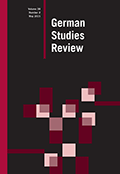
GERMAN STUDIES REVIEW
Scope & Guideline
Illuminating Contemporary German Culture through Scholarship
Introduction
Aims and Scopes
- Interdisciplinary Cultural Studies:
The journal emphasizes interdisciplinary research that connects various fields such as literature, history, film, and cultural studies, fostering a comprehensive understanding of German culture. - Focus on Memory and Trauma:
A significant focus on memory studies, particularly concerning the Holocaust, colonialism, and postwar narratives, reflecting on how these historical events shape contemporary German identity. - Exploration of Identity and Marginalization:
The journal frequently addresses issues of identity, including gender, race, and sexuality, exploring how these intersect with German culture and history. - Political and Social Critique:
Many articles engage with political themes, analyzing the impact of historical events on current social dynamics and the role of literature and art in political discourse. - Global and Transnational Perspectives:
The journal includes studies that explore Germany's cultural interactions with other nations, particularly in the context of migration, postcolonial studies, and globalization.
Trending and Emerging
- Decolonization and Postcolonial Studies:
There is a growing emphasis on decolonization and postcolonial studies, exploring Germany's colonial past and its impact on present-day identities and narratives. - Queer Studies and Gender Fluidity:
The journal is increasingly publishing works that engage with queer studies and discussions of gender fluidity, reflecting a broader societal shift towards inclusivity and diversity. - Environmental Humanities:
Emerging research in environmental humanities is gaining traction, particularly in relation to Germany's response to climate change and ecological crises. - Digital Humanities:
The integration of digital humanities methodologies is trending, with scholars utilizing digital tools to analyze texts and cultural artifacts in innovative ways. - Migration and Transnationalism:
Research focusing on migration and transnational connections is on the rise, highlighting Germany's role in global migration patterns and the resulting cultural exchanges.
Declining or Waning
- Traditional Nationalism:
Themes centered around traditional nationalism and ethnic homogeneity have seen a decline, as contemporary scholarship increasingly emphasizes multiculturalism and transnational identities. - Conventional Literary Canon:
There is a noticeable waning of focus on the conventional literary canon, with less emphasis on classical authors and more on marginalized voices and contemporary literature. - Historical Narratives without Critical Engagement:
Articles that present historical narratives without critical engagement or contemporary relevance are becoming less frequent, as the journal seeks more analytical and interdisciplinary approaches. - Eurocentric Perspectives:
Research that solely focuses on Eurocentric viewpoints is diminishing, with increasing emphasis on global perspectives that incorporate non-European contexts. - Static Gender Roles:
The exploration of static or traditional gender roles is declining, as the journal shifts towards more nuanced discussions of gender fluidity and intersectionality.
Similar Journals
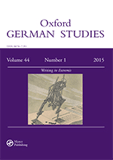
OXFORD GERMAN STUDIES
Exploring the Depths of German Literature and LinguisticsOXFORD GERMAN STUDIES, published by Routledge Journals, Taylor & Francis Ltd, is an esteemed academic journal dedicated to the exploration and scholarly examination of German literature and linguistics. With an ISSN of 0078-7191 and E-ISSN of 1745-9214, this journal has been in circulation since 1966, offering researchers a unique platform for critical discourse, innovative research, and interdisciplinary dialogue. It holds a significant position in the academic landscape, being categorized in the Q4 quartile for Linguistics and Language and Q3 for Literature and Literary Theory as of 2023. Despite lacking open-access options, the journal thrives in providing invaluable insights, aiming to bridge historical contexts with contemporary perspectives on German studies. It serves as an essential resource for scholars, professionals, and students eager to deepen their understanding of Germanic languages and literature. Located in Abingdon, United Kingdom, the journal continues to uphold its mission of advancing knowledge and fostering scholarly discussions in the rich field of German studies.
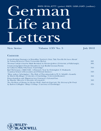
GERMAN LIFE AND LETTERS
Advancing Scholarly Discourse in German StudiesGERMAN LIFE AND LETTERS, published by WILEY, is a distinguished academic journal that has been a vital resource in the fields of Literature, Cultural Studies, and Sociology since its inception in 1936. With an impressive history spanning over eight decades, the journal is currently indexed with an E-ISSN of 1468-0483 and continues to serve as a critical platform for scholarly discourse and research across its converged years, encompassing materials from 1936 to 2024. Although classified in the Q4 and Q3 quartiles for various categories, its contributions significantly enrich our understanding of German literature and culture. Researchers, professionals, and students will find in this journal a captivating repository of insights, fostering a deeper appreciation for the interconnections between literature and socio-political themes. Unfortunately, it does not offer open access, but its wealth of knowledge and rigorous academic standards make it an essential read for those engaged in these disciplines.
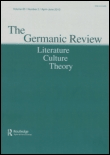
GERMANIC REVIEW
Charting the Course of Germanic Studies Through TimeGERMANIC REVIEW, published by Routledge Journals, Taylor & Francis Ltd, stands as a prominent academic journal dedicated to the study of Germanic languages, literature, and cultural studies. With an ISSN of 0016-8890 and an E-ISSN of 1930-6962, this journal has been a valuable resource for researchers and scholars since its inception, encompassing a wide range of topics within its field. Despite its Q4 ranking in Cultural Studies and Q3 ranking in Literature and Literary Theory, the journal has grown steadily in reputation, with Scopus ranks placing it within the competitive landscape of Arts and Humanities. The journal publishes contributions that delve into historical and contemporary issues, fostering a deeper understanding of Germanic cultures. By bridging literary analysis with cultural discourse, GERMANIC REVIEW invites academics, professionals, and students alike to engage with critical themes and methodologies that redefine the boundaries of Germanic studies. As a subscription-based journal, it remains dedicated to promoting scholarly communication and advancing knowledge in the humanities.
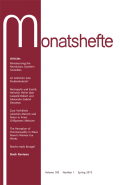
Monatshefte
Advancing Scholarly Discourse in German CultureMonatshefte is a prestigious academic journal published by the University of Wisconsin Press, dedicated to fostering scholarly discourse in the field of German Studies. With its ISSN 0026-9271 and E-ISSN 1934-2810, Monatshefte serves as a vital platform for researchers and students, offering peer-reviewed articles that delve into literature, culture, and linguistics. The journal plays an essential role in advancing knowledge and understanding of German intellectual traditions, making it indispensable for anyone interested in the dynamics of German culture. Although it is not an Open Access publication, its rigorous selection of high-quality research articles ensures its impact within the academic community. For researchers aiming to stay at the forefront of German Studies, Monatshefte provides a wealth of insights and critical analyses, fostering enhanced academic dialogue and innovation.

NEW GERMAN CRITIQUE
Challenging Conventions in the Study of German CultureNEW GERMAN CRITIQUE is a prominent academic journal published by Duke University Press, focusing on the dynamic intersections of German studies, cultural theory, and social thought. With its ISSN 0094-033X and E-ISSN 1558-1462, this journal facilitates a critical dialogue within the Arts and Humanities and Cultural Studies fields. As a Q3-ranked journal in both categories as of 2023, it represents a significant platform for scholars exploring contemporary issues through a German lens, addressing themes of identity, memory, and cultural politics. Although NEW GERMAN CRITIQUE is not an open-access journal, it remains a crucial resource for researchers, professionals, and students interested in the evolving landscape of cultural studies, inviting contributions that foster innovative perspectives and facilitate intellectual exchange. Founded in 1988 and continuing its vital discourse into 2024, the journal is headquartered in Durham, North Carolina, and serves as a touchstone for those engaged in the complexities of modern German culture and its global implications.

Anclajes
Empowering Voices in Literature and LinguisticsAnclajes is a prominent academic journal dedicated to the fields of Cultural Studies, Linguistics, and Literature, published by the UNIV NACIONAL LA PAMPA, FAC CIENCIAS HUMANAS. With both print (ISSN 0329-3807) and electronic (E-ISSN 1851-4669) formats, the journal has embraced an Open Access model since 2010, greatly enhancing its accessibility and reach to a global audience. Based in Argentina, Anclajes provides a platform for innovative research and critical discourse, contributing significantly to the understanding of cultural phenomena and literary theories. In recent years, the journal has established itself with a Scopus rank placing it in the top 30% of Literature and Literary Theory and the top 57% of Cultural Studies, as indicated by its quartile rankings for 2023. With issues converging from 2012 to 2024, Anclajes continues to foster scholarly communication and serves as an essential resource for researchers, students, and professionals seeking to explore the dynamism of human culture and expression.

Revista de Filologia Alemana
Fostering Critical Insights in German StudiesRevista de Filologia Alemana, published by Universidad Complutense de Madrid, serves as a vital platform for scholarly dialogue in the fields of Linguistics and Literature. With its origins dating back to 1996, this peer-reviewed journal provides insights and critical analyses that foster a deeper understanding of German philology and its broader implications. Although categorized in Q4 across both Linguistics and Literary Theory as of 2023, the journal represents a growing contribution to academic discourse, aiming to enhance knowledge and promote research within these domains. Although it does not currently offer open access, the journal continues to attract submissions from both established scholars and emerging researchers, thereby ensuring a diverse range of perspectives. With Scopus rankings highlighting its position within the academic landscape, Revista de Filologia Alemana is essential for anyone looking to delve into the intricate relationships between language and literature.
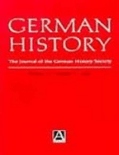
German History
Navigating the Complexities of German HistoryGerman History is a leading academic journal published by Oxford University Press, focusing on the rich and multifaceted history of Germany from the medieval period to contemporary times. With a strong emphasis on interdisciplinary approaches, this journal invites contributions that explore social, cultural, political, and economic aspects of German history. Established in 1984, and with comprehensive publication coverage from 1984 to 1994 and from 1996 to 2024, German History occupies a significant place in the historical field, currently ranked in the Q2 category as per the 2023 Scopus rankings. Although it does not offer open access options, the journal continues to uphold academic rigor and scholarly excellence, making it a crucial resource for researchers, professionals, and students engaged in the study of German history. With a commitment to fostering high-quality research and dialogue, German History remains an essential platform for critical discourse and groundbreaking scholarship in the field.
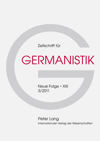
ZEITSCHRIFT FUR GERMANISTIK
Bridging Cultures through Rigorous Academic InquiryZEITSCHRIFT FUR GERMANISTIK, published by PETER LANG GMBH, is a distinguished academic journal that serves as a vital resource in the fields of German studies, literature, linguistics, and cultural analysis. With an ISSN of 0323-7982, this journal provides critical insights and promotes scholarly discourse surrounding the evolving landscapes of German language and literature. Although it operates under a traditional access model, readers and researchers benefit from its rigorous peer-reviewed articles that span decades of intellectual inquiry. Historically featured in Scopus, the journal is noted for its impactful contributions, ranking 244th in Literature and Literary Theory and 406th in Linguistics and Language, highlighting its importance in the academic community. Situated in Bern, Switzerland, ZEITSCHRIFT FUR GERMANISTIK not only caters to scholars seeking to enrich their understanding of Germanic studies but also aims to bridge gaps across interdisciplinary borders, fostering a deeper appreciation of the cultural narratives that shape our world.

COLLOQUIA GERMANICA
Unveiling New Perspectives in Language and Literary TheoryCOLLOQUIA GERMANICA, published by FRANCKE VERLAG, serves as a vital platform for the dissemination of scholarly research in the fields of linguistics, literature, and literary theory. With a rich history spanning from 2002 to 2017 and again from 2020 to 2024, this journal is indexed under ISSN 0010-1338 and is recognized within Q4 quartile rankings in both Linguistics and Language, and Literature and Literary Theory as of 2023. Although it operates primarily on a subscription basis, this journal endeavors to enhance academic discourse and promote innovative research that contributes to our understanding of Germanic languages and literature. Researchers and professionals can greatly benefit from the journal's content, given its position in Scopus with notable rankings and percentiles in various categories. COLLOQUIA GERMANICA invites submissions that offer fresh insights into the intricacies of language and literature, making it an essential read for academics and students alike.